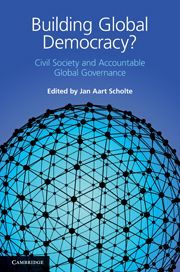Book contents
- Frontmatter
- Contents
- List of figures
- Participants in the Gothenburg Workshop
- List of contributors
- Editor's acknowledgements
- List of abbreviations
- Introduction
- 1 Global governance, accountability and civil society
- 2 Civil society and accountability of the United Nations
- 3 The World Bank and democratic accountability: the role of civil society
- 4 Civil society and IMF accountability
- 5 Civil society and the WTO: contesting accountability
- 6 Civil society and accountability in the Commonwealth
- 7 The Organisation of the Islamic Conference: accountability and civil society
- 8 Civil society and patterns of accountability in the OECD
- 9 Civil society and G8 accountability
- 10 Structuring accountability: civil society and the Asia-Europe Meeting
- 11 Civil society and accountability in the global governance of climate change
- 12 Civil society and accountability promotion in the Global Fund
- 13 Accountability in private global governance: ICANN and civil society
- 14 Civil society and the World Fair Trade Organization: developing responsive accountability
- Conclusion
- Bibliography
- Index
4 - Civil society and IMF accountability
Published online by Cambridge University Press: 05 June 2012
- Frontmatter
- Contents
- List of figures
- Participants in the Gothenburg Workshop
- List of contributors
- Editor's acknowledgements
- List of abbreviations
- Introduction
- 1 Global governance, accountability and civil society
- 2 Civil society and accountability of the United Nations
- 3 The World Bank and democratic accountability: the role of civil society
- 4 Civil society and IMF accountability
- 5 Civil society and the WTO: contesting accountability
- 6 Civil society and accountability in the Commonwealth
- 7 The Organisation of the Islamic Conference: accountability and civil society
- 8 Civil society and patterns of accountability in the OECD
- 9 Civil society and G8 accountability
- 10 Structuring accountability: civil society and the Asia-Europe Meeting
- 11 Civil society and accountability in the global governance of climate change
- 12 Civil society and accountability promotion in the Global Fund
- 13 Accountability in private global governance: ICANN and civil society
- 14 Civil society and the World Fair Trade Organization: developing responsive accountability
- Conclusion
- Bibliography
- Index
Summary
Introduction
The International Monetary Fund (IMF, also known informally as ‘the Fund’) is one of the most prominent, influential and, at times, contested agencies in contemporary global governance. Following a relatively sleepy existence in the first quarter-century after its creation at the Bretton Woods Conference in 1944, the IMF greatly enlarged its agenda, resources and membership to become a significant architect of accelerated globalisation, especially in the global south and the former Soviet bloc. In particular the Fund has been a crucial provider of balance of payments support during the recurrent crises that have plagued liberalised global finance since the 1980s. In addition, across the world the IMF is a major source of macroeconomic policy advice, technical assistance, training, policy research, and rules in respect of global financial flows.
From its headquarters in Washington, DC and field offices in over 70 countries and regions, the IMF has extensive involvements in governance of the world economy. In 2009 overall lending capacity of the Fund was raised to US$750 billion. During 2008–9, the IMF approved loans for balance of payments support totalling SDR 67.6 billion (around US$107.3 billion) to 43 national governments (IMF 2009a: 10). In addition, the IMF holds so-called ‘Article IV consultations’ with all of its 186 member states, on an annual or biennial basis, to monitor and advise on national macroeconomic policies.
- Type
- Chapter
- Information
- Building Global Democracy?Civil Society and Accountable Global Governance, pp. 78 - 104Publisher: Cambridge University PressPrint publication year: 2011
- 5
- Cited by



